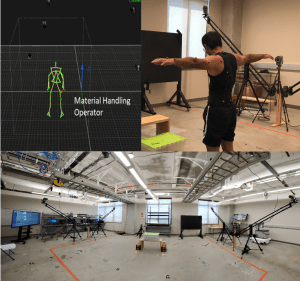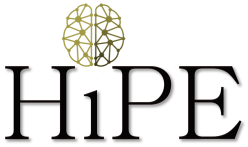
Timeframe:
Summer 2019 – Present
Students:
Geo Hernandez
Miguel Hernandez
Faculty in Collaboration:
Dr. J. Jimenez, Dr. D. Wierschem, Dr. F. Mendez, Dr. S. Alsan, Dr. R. Rolfe, & Dr. G. Koutitas.
Overview:
The goal is to develop a data capture and a Machine Learning approach to detect fatigue for material handling. The project entails forecasting fatigue in real-time through ML by captured ergonomic data and transmits data for Augmented Reality visualization.
Stages
Phase 1:
Data is collected as time-stamped motion data using infrared cameras at a rate of 100Hz while a subject performs one of the repetitive motions, lifting. The data is a combination of xyz-coordinates of 39 reflective markers. This results in 117 data points for each frame captured. Since these motions occur over time for a duration of time, this data is used as input toa time-series machine learning (ML) model such as Recurrent Neural Network (RNN).
Phase 2:
Development of motion capture simulations that mimic the movements for material handling tasks from human operators in 3D. Currently, the Julia programming language is used to read actual captured data, compile, and visualize movements.
Phase 3:
Underway
Publications:
- G. Hernandez, D. Valles, et al., “Machine Learning Techniques for Motion Analysis of Fatigue from Manual Material Handling Operations Using 3D Motion Capture Data,” 2020 10th Annual Computing and Communication Workshop and Conference (CCWC), Las Vegas, NV, USA, 2020, pp. 0300-0305, doi: 10.1109/CCWC47524.2020.9031222.
- M. Hernandez, D. Valles, et al., “An Initial Julia Simulation Approach to Material Handling Operations from Motion Captured Data,” 2020 11th IEEE Annual Information Technology, Electronics and Mobile Communication Conference (IEMCON), Vancouver, BC, Canada, 2020, pp. 0718-0722, doi: 10.1109/IEMCON51383.2020.9284829.
- T. Caroll. G. Hernandez, D. Valles, et al., “Comparison of Inverse Kinematics Algorithms for Digital Twin Industry 4.0 Applications,” 2020 IEEE International Conference on Systems, Man, and Cybernetics (SMC), Toronto, ON, 2020, pp. 3319-3326, doi: 10.1109/SMC42975.2020.9283253.
- A. Sharotry, J. Jimenez, D. Wierschem, F. Mendez, G. Koutitas, D. Valles, S. Aslan, R.M. Koldenhoven, “A Digital Twin Framework for Real-time Analysis and Feedback of Repetitive Work in Manual Material Handling Industry,” Winter Simulation Conference 2020. [In Press].
- A. Sharotry, J. Jimenez, D. Wierschem, F. Mendez, G. Koutitas, D. Valles, S. Aslan, R.M. Koldenhoven, “A Digital Twin Framework of a Material Handling Operator in Industry 4.0 Environments,” International Conference on Information Systems, Logistics & Supply Chain (ILS) 2020.
GitHub Channels:
Thesis:
- Underway


